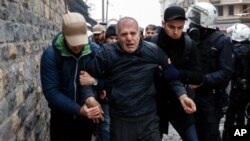Turkey’s policy of using indefinite curfews in its battle against the Kurdish rebel group PKK is facing growing criticism and scrutiny.
With the curfews affecting hundreds and thousands of people, and in many cases leaving them with no access to electricity or water, the European Court of Human Rights is now hearing a case calling for an immediate suspension of the policy. But the Turkish government has staunchly defended its actions as essential in the battle against terrorism.
The deaths this week of three prominent female activists of Kurdish civil society in the town of Silopi has highlighted the curfew policy. The bullet-ridden bodies of the women were found after they called for help, having been wounded.
A state official denied accusations that they had been executed by security forces. But both local and international human rights groups claim the curfew policy now enforced across much of the predominantly Kurdish southeast of Turkey is leading to the indiscriminate killing of civilians by the state.
Dr. Samet Menguc, general secretary of the Istanbul Medical Chamber, headed a delegation of health workers to the region subject to the curfews. He said a de facto war situation existed and that both the local people and the health workers were suffering extreme hardships and even deaths.
The delegation’s report accused security forces of killing an ambulance driver and wounding others. It also said thousands of people under curfew could not access basic medical facilities or even bury their dead.
Case against Ankara
In the case before the European Court of Human Rights, Riza Turmen, a former judge of the court representing Turkey and a member of the opposition Republican People’s Party, said there was a strong case to be made against Ankara.
"The curfew touches upon the right to life, the ban on ill treatment, on deprivation of liberty, because the curfew ... is not precise and it covers the whole province sometimes," he said. "Day and night, they cannot leave their house, for water, and for food, and for health services. So this is, of course, certainly is a disproportionate measure."
Ankara strongly defends the policy, claiming it is facing an unprecedented threat to public order from Kurdish rebels. But Turmen said the European Court heeds calls for an immediate interim ban on curfews, which could put Ankara and the Council of Europe on a collision course.
"It's a contractual obligation that the government should comply with," he said. "If the government refuses to comply with such an interim measure, then it becomes a political issue between Turkey and the Council of Europe because the committee of the ministers of the Council of Europe has the obligation and duty to supervise that the decisions of the court are complied with."
But with Europe’s leaders looking to Ankara for cooperation on handling the migration crisis and countering the Islamic State militant group, the council may be reluctant to stand up to Turkey, which observers say Turkish leaders could be banking on.




